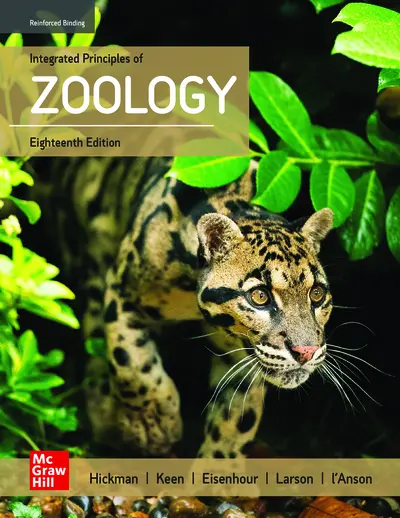CLEVELAND P. HICKMAN, JR.
Cleveland P. Hickman, Jr., Professor Emeritus of Biology at Washington and Lee University in Lexington, Virginia, has taught zoology and animal physiology for more than 30 years. He received his Ph.D. in comparative physiology from the University of British Columbia, Vancouver, B.C., in 1958 and taught animal physiology at the University of Alberta before moving to Washington and Lee University in 1967. He has published numerous articles and research papers in fish physiology, in addition to co-authoring these highly successful texts: Integrated Principles of Zoology, Biology of Animals, Animal Diversity, Laboratory Studies in Animal Diversity, and Laboratory Studies in Integrated Principles of Zoology.
Over the years Dr. Hickman has led many field trips to the Galápagos Islands. His research is on intertidal zonation and marine invertebrate systematics in the Galápagos. He has published three field guides in the Galápagos Marine Life Series for the identification of echinoderms, marine molluscs, and marine crustaceans. His interests include scuba diving, woodworking, and participating in chamber music ensembles.
SUSAN KEEN
Susan Keen is Associate Dean for Undergraduate Academic Programs, College of Biological Sciences at the University of California–Davis. She received her Ph.D. in zoology from the University of California– Davis, following a M.Sc. from the University of Michigan at Ann Arbor. She is a native of Canada and obtained her undergraduate education at the University of British Columbia in Vancouver.
Dr. Keen is an invertebrate zoologist fascinated with sea jelly life histories. She has a particular interest in life cycles where both asexual and sexual phases of organisms are present, as they are in most jellies. Her other research has included work on sessile marine invertebrate communities, spider populations, and Andean potato evolution.
Dr. Keen has been teaching evolution and animal diversity within the Introductory Biology series for 22 years. She enjoys all facets of the teaching process, from lectures and discussions to the design of effective laboratory exercises. In addition to her work with introductory biology, she offers seminars on teaching methods in biology, and works with an animator to create self-guided teaching modules on animal development. She has won awards for Excellence in Education from the Associated Students group at Davis. She attended the National Academies Summer Institute on Undergraduate Education in Biology, and was a National Academies Education Fellow in the Life Sciences for 2005–2006. Her interests include horseback riding, gardening, travel, and mystery novels.
DAVID J. EISENHOUR
David J. Eisenhour is professor of biology at Morehead State University in Morehead, Kentucky. He received his Ph.D. in zoology from Southern Illinois University, Carbondale. He teaches courses in environmental science, human anatomy, mammalogy, general zoology, comparative anatomy, ichthyology, and vertebrate zoology. David has an active research program that focuses on systematics, conservation biology, and natural history of North American freshwater fishes. He has a particular interest in the diversity of Kentucky’s fishes and is writing a book about that subject. He and his students have authored several publications. David serves as an academic advisor to prepharmacy students. His interests include fishing, landscaping, softball, hiking, and entertaining his three children, who, along with his wife, are enthusiastic participants in fieldwork.
ALLAN LARSON
Allan Larson is a professor at Washington University, St. Louis, MO. He received his Ph.D. in genetics at the University of California–Berkeley, following B.S. and M.S. degrees in zoology from the University of Maryland. His fields of specialization include evolutionary biology, molecular population genetics and systematics, and amphibian systematics. He teaches courses in introductory genetics, zoology, macroevolution, molecular evolution, and the history of evolutionary theory, and has organized and taught a special course in evolutionary biology for high-school teachers. Dr. Larson’s students have participated in zoological field studies around the world, including projects in Africa, Asia, Australia, Madagascar, North America, South America, the Indo-Pacific Ocean, and the Caribbean Islands. Dr. Larson has authored numerous scientific publications, and has edited for the journals The American Naturalist, Evolution, Journal of Experimental Zoology, Molecular Phylogenetics and Evolution, and Systematic Biology. Dr. Larson serves as an academic advisor to undergraduate students and supervises the undergraduate biology curriculum at Washington University.
HELEN I’ANSON
Helen I’Anson, a native of England, is the John T. Perry Professor of Biology and Research Science at Washington and Lee University in Lexington, Virginia. She received her Ph.D. in physiology at the University of Kentucky, Lexington, and postdoctoral training at the University of Michigan, Ann Arbor. She teaches courses in animal physiology, microanatomy, neuroendocrinology, general biology, and reproductive physiology. She has an active research program that focuses on the neural regulation of energy partitioning during development using the female weanling rat. In particular, she is interested in mechanisms regulating the development of childhood obesity. Currently, she is studying the role of snacking from weaning to adulthood in the onset of childhood obesity. Her interests include gardening, hiking, fishing, aromatherapy, music, and participating in choral ensembles.
Her interests include gardening, hiking, fishing, aromatherapy, music, and participating in choral ensembles.
